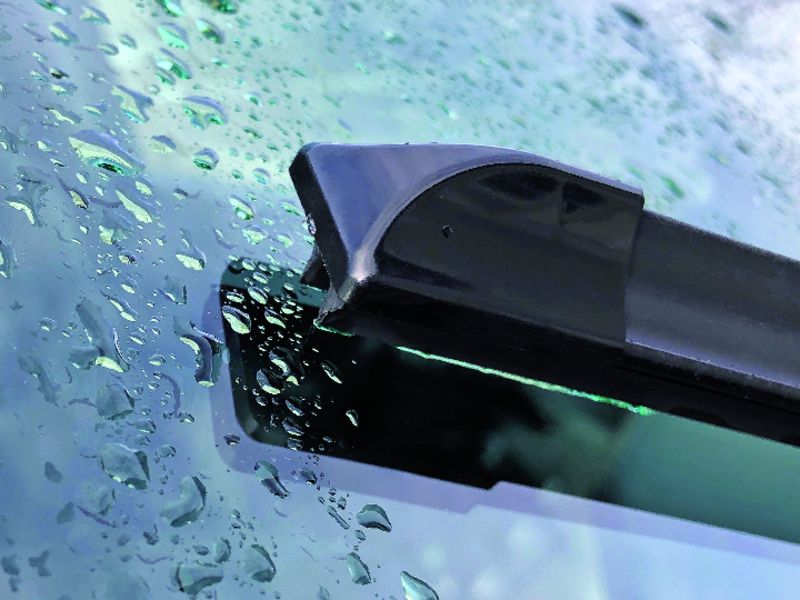
Not all the hot new technical innovations these days are about advanced autonomous driving and futuristic artificial intelligence-infused components.
There also are windshield wipers.
“You still have to change your wiper blades, right?” reasons Jean Marie Thrower, an industry business development adviser who works with auto suppliers in different segments. “Maybe it’s not as sexy as autonomous driving, but automakers still want to hear about it.”
Thrower, a former Army Airborne logistics officer and former Visteon steering operations manager, represents the other side of the industry’s innovation wave. It’s one thing to dream up and perfect a technological breakthrough — it’s another to sell it.
For the past three and a half years, Thrower has been assisting ClearBlade Inc., a Denver startup that is standing by to produce original equipment double-bladed wiper systems for automakers.
ClearBlade claims that its twin-blade design — with outlets embedded into the wiper that administer cleaning fluid as the blades swipe — does twice the cleaning and makes better use of the streams of fluid, which in a traditional wiper system often drain away before making contact with a wiper blade.
The fact that ClearBlade bears a passing resemblance to something already on the market — “Magic Vision Control,” a double-blade wiper system developed by Mercedes-Benz and Valeo and introduced several years ago on Mercedes models — is not a problem, Thrower said. In fact, it is ClearBlade’s selling point.
A Mercedes owner must take their vehicle into a Mercedes dealership for service techs to carefully remove and replace the premium wiper blades. That service visit, with parts and labor, typically runs a few hundred dollars.
ClearBlade’s benefit is that it is a simpler design that can be popped into place by vehicle owners in their driveway. And that simplified construction will enable it to sell for as little as $15 to $30.
ClearBlade was granted a patent for its design in 2016, and the company even mentioned its Mercedes competitor in its patent application to drive home the point of its difference.
With the help of Thrower, whose female- and veteran-owned Supplier Development Systems operates out of Birmingham, Ala., ClearBlade has sourced all the individual components of the system and established a manufacturing venture in India with Padmini VNA Mechatronics to mass-produce it.
The ClearBlade group is now calling on a list of vehicle manufacturers to talk about opportunities.
“It comes down to a simpler design,” Thrower said, “and a simpler design means simpler manufacturing, which means a much lower cost.
“So it becomes a component that you can put on a Ford Festiva or a Nissan Versa. See the attraction? You can afford to give lower-priced vehicles what’s perceived as a Mercedes windshield wiper.”
So far, Thrower has put the ClearBlade team at the table with automakers in the U.S., China, Europe and India.
In calling on one Midwestern U.S. automaker, Thrower and ClearBlade reps flew into town and rented a Ford Explorer at the airport. They left the rental car property and pulled over to the side of the road. Thrower got out and removed the Explorer’s wipers and plugged in a ClearBlade system to replace them.
“It took three minutes,” Thrower said. The purchasing managers they met with were positive about the product but particularly intrigued that it could be snapped onto an existing windshield with no concern for factory specs.
When the ClearBlade team returned to the rental agency, Thrower removed the ClearBlade parts and put the Ford factory wipers back on.
“We hijacked their vehicle for a demo,” Thrower said. “But it made a good point.”
Thrower is pursuing other marketing strategies. One of them is to sell directly to the aftermarket, and the group is having discussions with one auto parts retailer that would package the system and merchandise it under the chain’s brand name.
This year, the company also announced a partnership with the Chinese manufacturer Shenghuabo Group, one of China’s leading windshield wiper suppliers. Shenghuabo Group is interested in developing market share in North America and Europe.
But as humble as the windshield wiper is in these days of advanced electronics, they remain the turf of a number of fierce global competitors.
To make an inroad into the market, ClearBlade must slip around Bosch, Denso, Valeo and not least of the group — Trico, the American manufacturer credited with inventing windshield wipers in 1917.
Thrower has also met with some of the established suppliers to present the idea. But she warned her Denver clients going in that it would be a long shot for an established supplier to embrace another company’s innovation.
“And that’s more or less what they told us,” she said of those visits. “They have their own R&D departments. Why would they need my guys?
“But,” she added, “we have something they don’t. We have the patent.”

